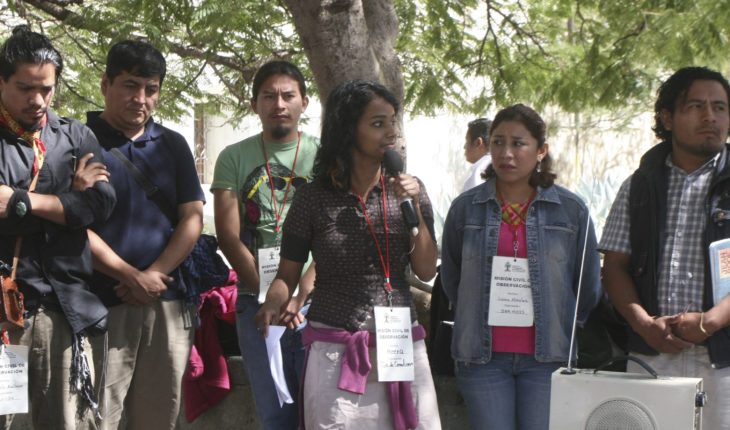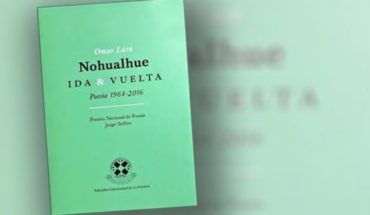last October took place a popular judgment against the State and the mining companies that have violated the rights of native peoples and impacted the environment in Oaxaca.
Indigenous peoples demand in the opinion issued during the Popular trial a moratorium statewide banning mining activity throughout the territory of the State; the definitive cancellation 322 existing concessions, as well as the 41 existing mining projects in the State.
Companies judged by the Indians, the past 11 and 12 October were: high furnaces of Mexico, Fortuna Silver Mines, Comisión Federal de Electricidad, among others.
Also sued a number of authorities, mainly to the visitors of the Procuraduría Agraria (harassment by settlers); the secretariats of economy, environment and governance; the Attorney Federal protection to the environment (PROFEPA); the national water Commission (CONAGUA) and various local authorities, by granting operating permits that put at risk the territory and natural resources, especially water, resource that mining companies use up to a million and a half liters a day, according to the report.
Indians, members of 52 Oaxacan communities composed of 16 cultural groups, also conducted a series of meetings a year.
In these assemblies have documented the main effects caused by mining projects, ranging from labour exploitation in very poor condition, disappearance of springs, discrimination, disappearance of mother tongues, diseases pulmonary workers, pollution in major rivers and streams, social polarization and division of social fabric, among the most important.
A report of the International Oxfam organization realizes 22 cases in which the mining concessions granted by federal and local governments have impacted the environment, community life and has even claimed lives in the villages located in the valleys plants, mainly Zapotecs.
The most recent case and who served as launching point for the realization of the popular judgment are existing concessions in the municipality San José del Progreso, some of which expire until the year 2052 and were granted by the Ministry of the economy without prior consultation to communities, according to the report.
The project “San José”, operated by the company Minera Cuzcatlán, branch of the Canadian ‘Fortuna Silver Mines’, has left a balance of four murders from the mining conflict between 2009 and 2012, as well as eight people injured by a gunshot during the same period and the constant use of armed groups to harass the defenders of the Earth, warns the report.
There is also damage to the health and safety of the population: explosions, spills at the dam; the constant emission of a fine dust from a shredder plant of rocks and decrease in drinking water. “People are worried about what is breathing. A query was never made but the community is given account that the mine has begun to operate because the level of wells.
The project went without a prior informed consent process and its concrete and most tangible effect is the community split that occurs because there is a process of acceptance of the mine; Some say that Yes, others, mine won’t be with those who say that if leaving out others and the entire process is extremely murky,”explained Animal politician Oxfam Méx human rights and extractive industries projects coordinator ICO, Roberto Stefani.
And the so-called benefit economic and development in the region has not reached its inhabitants, who have only received a fraction of the profits from the exploitation of their lands: the San Jose project, for example, left two thousand in 2014 124 million pesos of which the company only paid 2% communities. The jobs promised by the projects carried ‘progress’ these people nor has been reflected: the project mentioned only uses 5.3% of the total municipal population, according to the report.
In the past 30 years State and federal governments have granted concessions to domestic and foreign without consulting them, companies situation that worsened in the Governments of Vicente Fox, Felipe Calderón and Enrique Peña; so they decided to follow the example of other Latin American people who suffered from the same problems and made the first popular trial against the State and the companies that extracted silver and gold, mainly.
Disappearances, threats, ecosystems broken October 7, 2018 there was an overflow from the tailings of the mine project “San José”, which directly affected the El Coyote River in the community of Magdalena Ocotlán. A sign warns people that do not consume water from the well of the community because it is near this river. Since then, people have not been able to use the well, which is the main of the municipality, according to Roberto Stefani.
In the community of Silacayoapilla, mainly Mixtec people, indigenous Zapatista agrarian movement (corn) demand community trial to minera Autlan by the disappearance of Sergio Rivera Hernandez, one of its members, since last August in the State of Puebla.
In the community the Cup, in the municipality of Juchitán, the Cooperativa Cruz Azul has two existing concessions. “Together with its operators, began to divide neighbouring farmers of the Hill of the eustachian tube, negotiating and offering money. Several defenders have been threatened with death and have fear of suffer any direct aggression,”referred to the testimonies cited in the report.
This community also denounced the environmental impact: every day you can see many birds and dead bats that are hit by wind blades, which has diminished the presence of birds in the area and causes a lack of pollination of fruit trees flowers and crops; the foundations of wind turbines in the stage of construction have caused drought with its deep excavations that have broken veins of the water table, diverting them or dry them completely.
The effect of these damages is not only environmental but social: population migrates in search of work and leaves the field, also because the land renting companies become private property during the term of the contract, restricting access to the employees of the company. “Farmers cannot work his land or graze animals or if you want to pick up firewood and medicinal plants, the roads are monitored by private security placed feathers of toll to obstruct freedom of movement of the inhabitants”, says the report.
Another case that generated demands is Santiago Niltepec, where mining concessions threaten the river of the same name and the entire system of streams that flow into it and which end in the Ikoots lagoon system. This threatens the sovereignty of food in the region, since to contaminate the Lakes cancels one of the main sources of food for the inhabitants of the isthmus, which are marine products. “A strong factor that facilitates the arrival of mining projects is the presence of caciques linked historically with the PRI in Oaxaca State elites, as well as networks of corruption that has been woven around the control of local governments”, he argues the lawsuit filed by the Popular Assembly of the people of Niltepec.
Stefani says that in Mexico any mining process has had a prior consultation with the people, as they mandated the international treaties of Nations Unidasfirmados by Mexico. “All the queries are about things that already are underway, there are no cases of really free, prior, and informed consultation. In Mexico there is a process of inquiry in every project, but so far have not been actual consultations, have been procedures”, says Oxfam researcher.
According to the Secretary of mining of 2017, in Mexico are registered 988 mining projects operated by companies with foreign capital. In Oaxaca, until 2017 were reported to the Secretariat of economy 41 mining projects driven by 38 companies of Canadian, American, Peruvian, Australian and Mexican origin.
And the contribution of this industry to public finances is “laughable”, says Oxfam’s report: just 0.35% of revenues the federal Government by paying taxes, according to figures from the founding organization receives: I.e., that the federal Government collects not nor not even 1% of their income through mining, in contrast to how profitable is the activity for companies.
Therefore, the defenders of the land in Oaxaca reject any mining project across the State; they require a series of legal reforms that guarantee respect for the rights of indigenous peoples established in international treaties which Mexico is a party, and require the Ministry of economy to suspend the issuance of titles of mining concession in the territories of ejidos and communities.
In accordance with requests for information cited in the report, since January 2002 and until April 2016 the Ministry of economy has given 25 thousand 716 titles of mining concessions in the country, being the Governments of Vicente Fox, Felipe Calderón and Enrique Peña Nieto where has been issued the largest number of grants for projects of exploration and exploitation of minerals in the territory of peoples and communities: around 10 million hectares of the country have been under concession mainly to companies registered in Canada, United States, Peru, Australia and Mexico.
translated from Spanish: Indigenous people of Oaxaca demanding the total ban on mining
December 10, 2018 |





